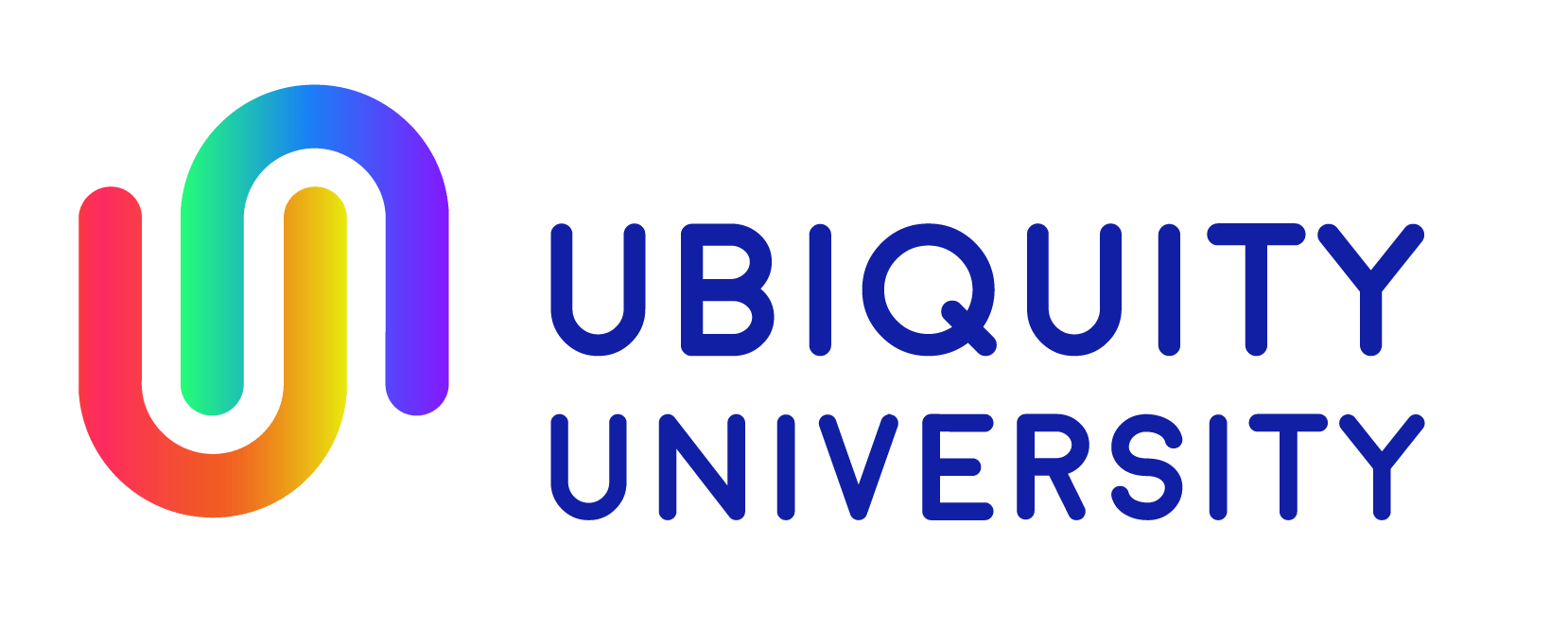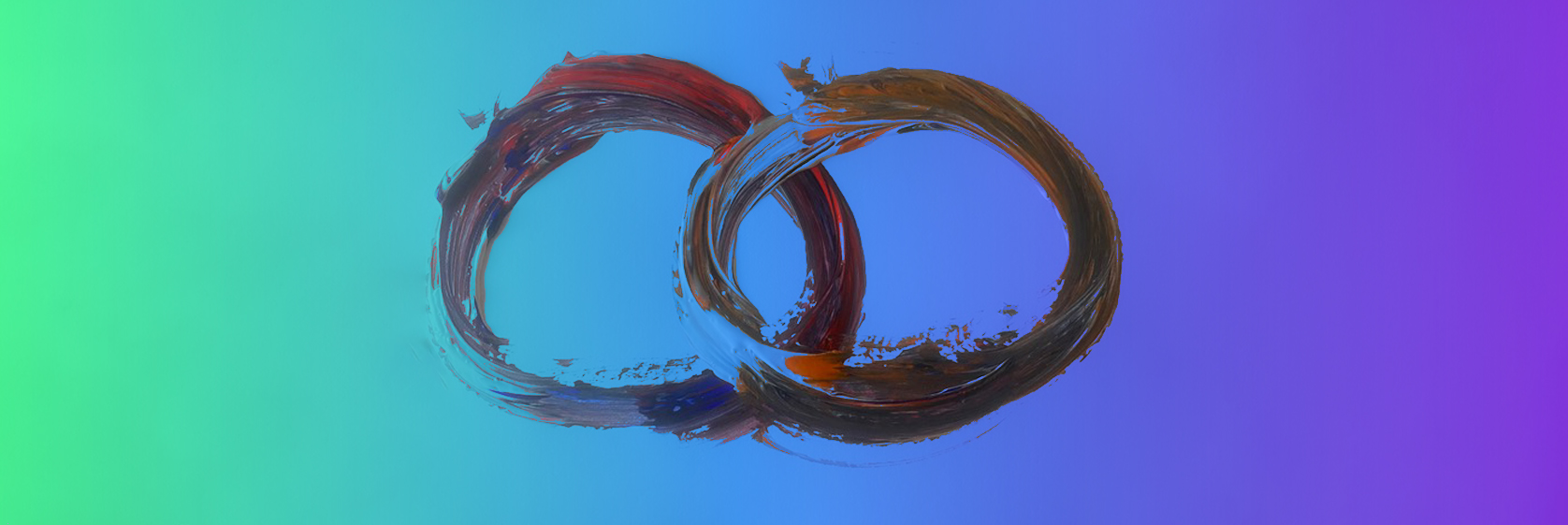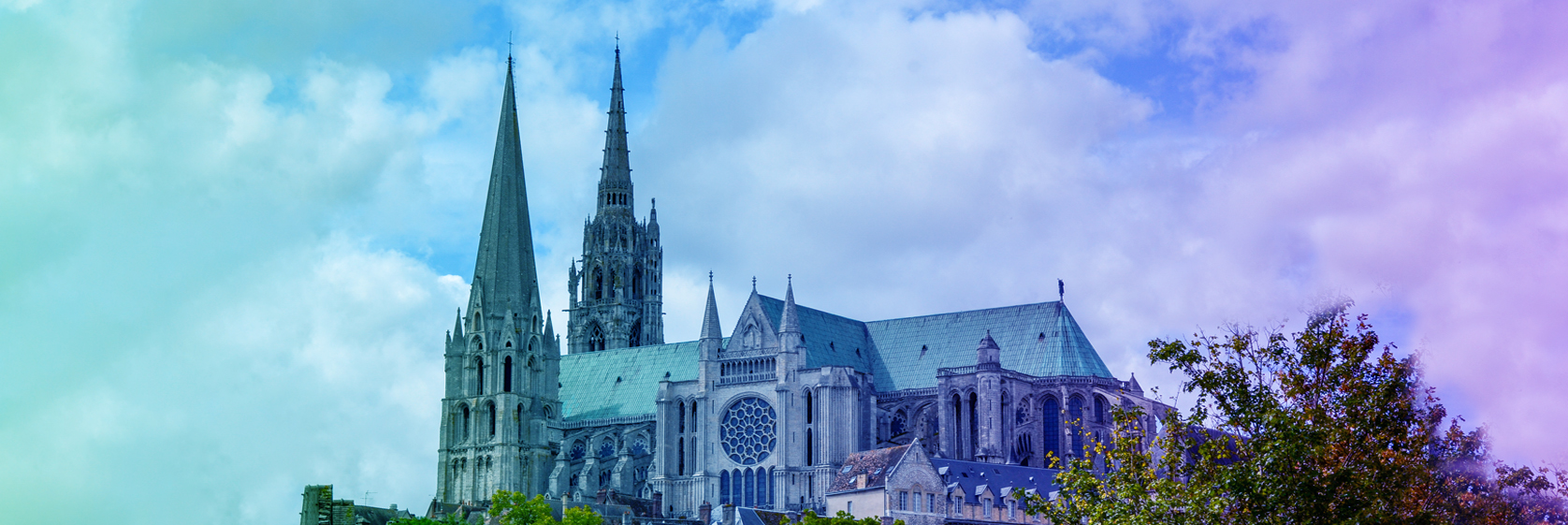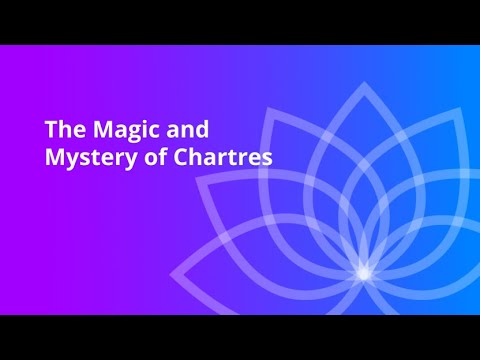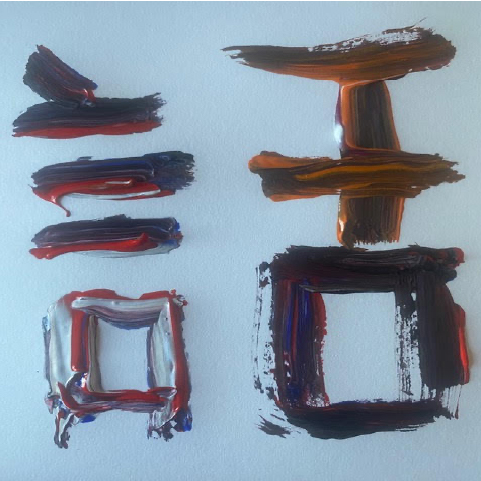Header Image: Original painting by Calen Rayne
Immerse yourself in this 7-day virtual initiation in the second of the Liberal Arts — Dialectica, which concerns the power of opposites reworked for a 21st Century context. As we always do each year, we conducted the time together as sacred rite and ritual. There were opening invocations, a virtual descent into the crypt of the cathedral, a virtual walk of the labyrinth, we held ritual and engaged in deep dialogue about the deeper meaning of what it means to hold opposites in our world. We honored the opposites. We held everyone and all perspectives as One.
Download Chartres Labryinth to use for meditation
Join the Chartres Community in conversation on the Ubiverse, the Ubiquity Community Platform
Chartres Community Calls – Join the faculty and participants in a monthly call on the second Sunday of the month for discussions on the topics included in the intensive. Register for future Calls.
Watch past community calls: January 10, 2021 February 14, 2021 March 14, 2021 April 11, 2021 May 9, 2021
The Second Liberal Art of Dialectica
Identity and the Other: Dialogues at the Intersection of Race, Gender, Ethnicity, and Sexuality
Dialectica is the second of the seven liberal arts devised initially by Pythagoras, Plato and Aristotle in ancient Greece. It corresponds to the second chakra which is about opposites, about self and other, about sexuality and generativity when the opposites come together. In this course, we explore what the ancients taught about the nature of “Dialectics” – the science of understanding how opposites take shape, collide, synthesize, and are thereby transformed into a third thing. Dialectics is how the universe, how life itself, sustains the constant process of growth. Everywhere one looks, one finds opposites in creative tension — light and dark, yin and yang, creative and receptive, male and female, high and low, inner and outer — this is what makes the world go round. It is also what stops our world when the opposites clash and violence against the other ensues.
When Aristotle developed Dialectica, he was thinking more about logic and the logical syllogisms that enable rational discourse and scientific inquiry. This was how Dialectica was classically taught. In this course, we want to bring Aristotle’s insights into an interface with contemporary challenges. Our world is comprised of far more than logical syllogisms. Logic collides with passion and it is passion, far more than logic, that animates history. To pursue dialectics, one’s thinking must be fluid so that one can grasp not only earthly knowledge but also the reality of spiritual truth. The one who is master of Dialectica stands between the heights and the depths, the self and the other, and brings the opposites into creative union.
Understanding this in the original Chartres Academy 1,000 years ago, students of Dialectica sought to come into right relationship with the planet Mercury and the god Hermes, known in ancient times as the winged messenger who could swiftly move between the gods and the world of human beings. Mercury and Hermes shapeshifted as conditions required. This is at the heart of Dialectica, and this is the central challenge of humanity today — how do we reimagine who we are and embrace new forms of living and relating for a new world to ensure human survival?
The planetary alignments for 2021 will accentuate the dialectic of relationships. The squaring of Saturn and Uranus over the year ahead indicates dialectical tensions between the old and the new, good and evil, progressive and conservative will dominate human affairs. 2021 will be a year in which differences will be accentuated and all relationships with “other” will be tested and reworked into new forms. We see this on the news every day.
One of the greatest dialectics in the world today is happening around the issue of race and ethnicity. The pandemic has challenged all of us to think more deeply about who we are as humans and nothing has galvanized the discussion more than the killing of George Floyd May 25, 2020 when he died gasping “I can’t breathe… I can’t breathe…” with a white police officer’s knee on his throat. Racial attacks, hate crimes anti-foreigner sentiment are on the rise globally.
Another ignition point has come around the issue of gender and sexuality. Gender has become mercurial, shapeshifting right before our eyes. Something deemed eternal and constant for thousands of years of patriarchy — the definition of and distinctions between male and female — is breaking down and returning to its natural form. Gender and sexual fluidity are emerging to reframe formerly clear distinctions into new identities that are reinventing what it means to be male and female and thus what it means to be fully human. This has ignited all manner of violence against women and against those experimenting with new gender and sexual forms, especially against people of color. Thus the intersection between race and gender, ethnicity and sexuality is a vital global human concern.
Somehow we must move from “other” as enemy to “other” as simply another guise for our own selves. We are the other. The other is us. Diversity is natural. Humanity is one. The pathway of moving from opposites once considered fixed and indisputable, to opposites merging with one another and creating new identities is a model for how our identities and our relationships must morph with ever-changing conditions. This is what the 2021 course on Dialectica explores. We dialogue about how the ancient wisdom of the second liberal art can inform our discernment of our essential identities in a diverse world. The anvil upon which this exploration will take place will be the interface of race, gender, ethnicity, and sexuality.
Credit: Original painting by Calen Rayne
Faculty — This Course was conducted in dialogues rather than lectures. The issues we discussed are profoundly nuanced and require deep listening and communal discernment. All dialogues were held within the sacred container of ritual, walking the labyrinth, entering the crypt and community reverence for the Sacred Feminine, so deeply present in Chartres, who holds all opposites as fractals of the One.
- Donovan Ackley, PhD, scholar and activist specializing in the interface of mental health, spirituality, trauma recovery and LGBTQ+ issues. Author of “Sex and Sacrament: A Queer Liberation Theology of Prayer and Worship” and “Queer Preaching & Exegesis for Revolution & Resistance.”
- Shelly Alcorn, Chief Operating Officer, Ubiquity University
- Apela Colorado, PhD indigenous scientist and elder of the Oneida-Gaul ancestry, founder of the World Indigenous Science Network will invoke our days and guide the exploration of our dreams as well as offer perspectives on race from a Native American perspective.
- Ruth Cunningham, classically trained musician, sound healer and founding member of the Anonymous 4 will create soundscapes during the week.
- Jim Garrison, PhD Founder and President of Ubiquity University, lifelong scholar of history, philosophy and religion, will offer daily “nuggets” and moderate the virtual sessions of Grammatica.
- Andrew Harvey, PhD (Hons), author of numerous books on mysticism, including the first book on gay mystics who will speak to the gender fluidity underway.
- Calen Rayne, DMin will share insights on the labyrinth and lower church, and assist with preparation for ritual experiences.
- Banafsheh Sayyad, Founder, Dance of Oneness, will lead us in embodiment practices
- Joyce Hope Scott, Clinical Professor of African American Studies, Boston University
Requirements for enrolled degree students to earn 4 Credits:
Required Reading (choose three of the following books for your course reading):
- Michelle Alexander, The New Jim Crow
- Anne Baring, The Dream of the Cosmos or The Myth of the Goddess
- Kate Bornstein, A Queer and Present Danger
- Leslie Feinberg, Stone Butch Blues
- Matthew Fox, Sacred Masculine
- Andrew Harvey, Return of the Mother
- CN Lester, Trans Like Me: Conversations For All of Us
- Rene Querido, The Golden Age of Chartres
- Philip Shepherd, New Self, New World
End of course essay regarding the learnings in this course using APA style.
- For BA students – 6-9 pages in length
- For MA students – 10-15 pages in length
- For PhD students – 20-25 pages in length
All papers must be written to the APA standard and demonstrate the “subject/object synthesis” — we want students to demonstrate command of the content of the course, and we want students to demonstrate how they have been affected by what they have learned, how the content has informed their spiritual or personal development. We welcome all forms of artistic expression as part of the student’s paper.
Recommended Watching:
Sherri Mitchell, Indigenous rights activist and spiritual teacher, and Brenda Salgado, healer and movement builder (2020) “On Indigenous Wisdom for Healing Trauma,” California Institute of Integral Studies (CIIS) Public Programs. Original live webcast Saturday, August 1, 2020. Two Indigenous women scholars share about 5 genders before colonization, that these genders including Two Spirits are not the same as Western sexual orientation identity, how colonization imposed a gender and sexual binary that has been spiritually destructive to all people and creatures, and how Indigenous spiritual wisdom heals — an invitation that if led by Indigenous people trained and rooted in this wisdom can heal all — including collective trauma still happening now.
On Indigenous Wisdom for Healing Trauma with Sherri Mitchell and Brenda Salgado [Approximately 90 minutes.]
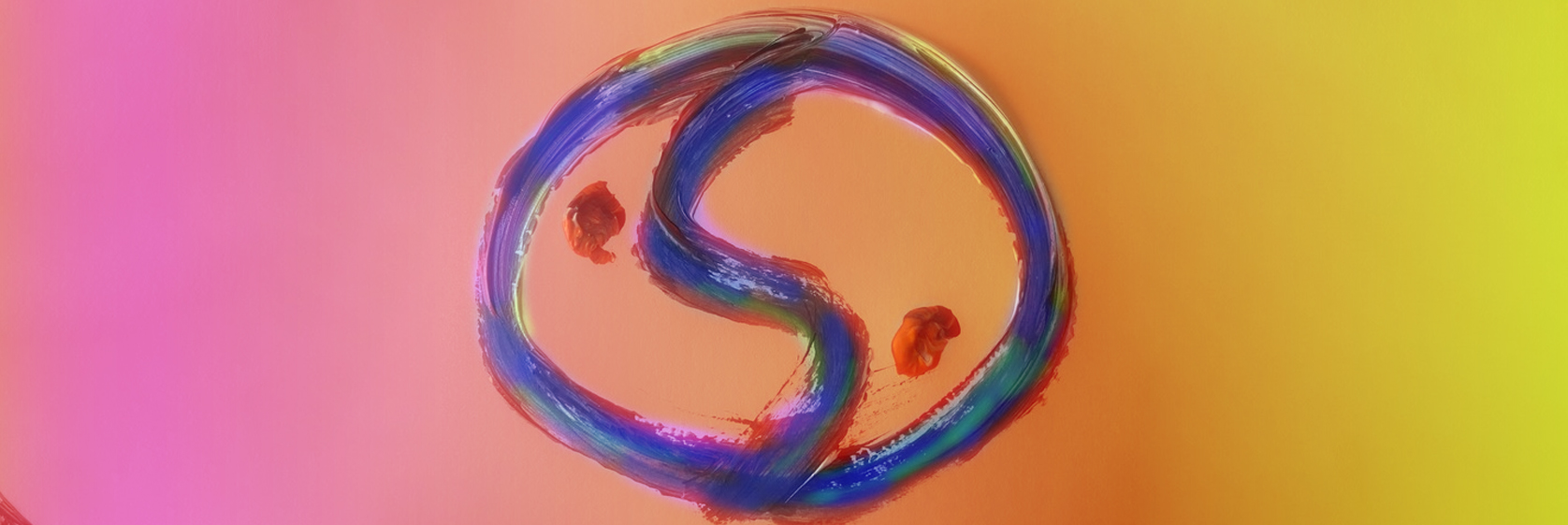 Credit: Original painting by Calen Rayne
Credit: Original painting by Calen Rayne
Schedule
Day 1
- Invocation with Apela Colorado
- Star Report with Lynn Bell
- Welcome and Faculty Introductions with Jim Garrison
- Small Group Discussions
- Presentation on Chartres/Liberal Arts/Dialectica by Jim Garrison
- Ritual Close
Day 2
- Invocation with Apela Colorado
- Star Report with Lynn Bell
- Opening Reflection with Jim Garrison
- Donovan Ackley, Andrew Harvey, Joyce Scott and Shelly Alcorn dialogue on dialectic of Gender/Race
- Small Group Discussions
- Crypt Ritual
Day 3
- Invocation with Apela Colorado
- Star Report with Lynn Bell
- Opening Reflection with Jim Garrison
- Donovan Ackley on Historical Trauma: Gender and Sexual Orientation
- Small Group Discussions
- Ritual Close
Day 4
- Invocation with Apela Colorado
- Star Report with Lynn Bell
- Opening Reflection with Jim Garrison
- Embodiment Practice with Banafsheh Sayyad
- The Labyrinth with Calen Rayne, Jim Garrison and Banafsheh Sayyad
- Small Group Discussions
- Labyrinth Ritual
Day 5
- Invocation with Apela Colorado
- Star Report with Lynn Bell
- Opening Reflection with Jim Garrison
- NextGen on Gender/Race with commentary from Donovan Ackley, and Shelly Alcorn
- Small Group Discussions
- Ritual Close
Day 6
- Invocation with Apela Colorado
- Star Report with Lynn Bell
- Opening Reflection with Jim Garrison
- Community Celebration and Dream Circle with Apela Colorado
- Ritual Close
Day 7
- Invocation with Apela Colorado
- Star Report with Lynn Bell
- Summary of the Week with Jim Garrison
- Small Group Discussion, Large Group Affirmations, and Testimonials
- Closing Ritual
Questions: Please do not email faculty directly with any technology or registration issues. If this is your first time purchasing from us, or you need a refresher, we suggest you review our tutorial How to Purchase a Course. If you do not have a user account, you will be required to create one upon your initial purchase. Save your username and password as you will need it to login to access course materials later and to make purchasing faster in the future. If you need technical assistance you can use the chat button located at the bottom, left-hand side of the screen and you can also email our Registrar, Veronica Saldias at registrar@ubiquityuniversity.org.
Information about how we process refund or cancellation requests can be found here: Refund and Cancellation Policy.
Archived Webinar Contact Information:
If you have questions or require additional assistance, you may click the “Chat” button on the lower, left-hand side of the screen, and submit your question. Our help desk will respond as soon as possible. Please do not email faculty directly with any technology or registration issues.
Our Lineage
Ubiquity Chartres Academy builds upon and reinterprets the original Chartres Academy founded by Fulbert in 1006 when he became bishop of Chartres. Fulbert called his school the Academy to indicate that he was in the lineage of Plato’s Academy founded in 387 BC in Athens. We at Ubiquity University are privileged to be in this lineage and to count Fulbert and Plato among the giants upon whose shoulders we sit.
Our Chartres Academy is intended as a gathering point for a contemporary wisdom community to come together through the very same learning system that Fulbert and Plato used — the seven Liberal Arts. The Liberal Arts were initially refined by the Greek philosopher Pythagoras, who organized the first four, called the Quadrivium, comprised of music, mathematics, geometry, and astronomy. Plato learned the Quadrivium from Pythagoras and with Aristotle developed the Trivium of grammar, rhetoric, and logic. Together, they form the seven Liberal Arts.
The Liberal Arts were designed by these great thinkers as initiatory rites into the deepest truths about the universe, with each Liberal Art describing a certain essential element of the larger whole and designed to prepare the students for both professional skills and spiritual awareness. The goal for both students and teachers was to participate in an alchemical process of transformation leading to a deeper understanding of the universe and how to live an active compassionate life in the community.
Building on this foundation, the Seven Liberal Arts were brought to their highest expression by the Chartres Academy during the eleventh and twelfth centuries. The seven arts also shaped the education refined during the Renaissance and gave rise to our modern “liberal arts” education, although education today has long lost the deep spiritual aspects of the original liberal arts. This is what the academies of Plato, then Fulbert, sought to instill, and that now our Chartres Academy seeks to recover and utilize as a transformational tool for what Plato called “the enlargement of the soul.”
What makes the Chartres Academy such a powerful experience is that it convenes in one of the most sacred sites in the world — the place which the ancient Druids, coming to the region over 3,500 years ago, considered the most sacred site in all of Europe, full of feminine energy. Each year, the entire Celtic tribe would convene in Chartres, called their Vatican, meaning “the seat.”
This is the site where the cathedral now stands. Chartres has been a focal point for the veneration of the Divine Feminine and a center for the mysteries of healing and birth for thousands of years and has been considered sacred from the earliest of times. This veneration was memorialized in stone and glass in the sweeping Gothic architecture of the cathedral, which the builders viewed as a form of sacred writing. Over 400 images of the feminine grace its walls and stained glass windows. The great mythologist Joseph Campbell called Chartres the ”womb of the world.“ It is also known as the “queen of cathedrals,” such is the beauty and perfection of its form. It rivals the Taj Mahal as an architectural masterpiece designed and built in the spirit of love.
Fulbert and the Chartrian Masters who succeeded him, following Pythagoras and Plato, guided by the sacred feminine, understood that proportion and rhythm underlies the order of the cosmos. Their genius is that they were able to represent this perfection in the cathedral they built as a tribute to this truth.
Testimonials from Virtual Grammatica in the Summer of 2020
The virtual journey into the heart of Chartres Cathedral, the heart of Ubiquity University, filled me with deep wisdom from the magnificent past of the Cathedral and hope for the future…I discovered new ways to strengthen my heart-mind coherence, my life-force, and new ways to transform the global trauma we are profoundly experiencing today.
– Janice Sealey
Virtual Grammatica was an inspiring program, delivered with care and consideration to the precious Chartrean community – I loved the skilful way in which the faculty sought to apply this first Liberal Art to the current world crisis. It was a week of sharing, insight, community, wisdom and love.
– Clair Hiles
The virtual offering of Grammatica far exceeded expectations and invited a transpersonal engagement of the heart which has inspired and informed personal, professional and academic commitments.
– Linda White
This was an answer to a prayer that someday you would bring this work to us virtually.
– Barbara Joyce-Lambert
The Chartres Wisdom School provides a true education for the soul, as well as the mind and body. It is precisely that: A WISDOM School of the highest order.
– Ann Debaldo
